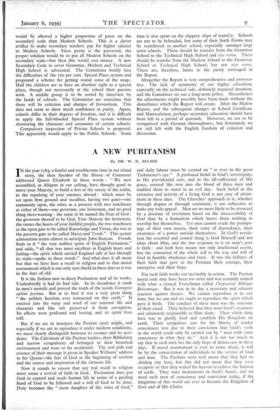A NEW PURITANISM
By DR. W. B. SELBIE
IN the year 1563, a fateful and troublesome time in our island story, the then Speaker of the House of Commons addressed Queen Elizabeth in these words : " We now assembled, as diligent in our calling, have thought good to move your Majesty, to build a fort to the surety of the realm, to the repulsing of your enemies abroad : which must be set upon firm ground and steadfast, having two gates—one commonly open, the other as a postern with two watchmen at either of them—one governor, one lieutenant, and no good thing there wanting : the same to be named the Fear of God : the governor thereof to be God, Your Majesty the lieutenant, the stones the hearts of your faithful people, the two watchmen at.the open gate to be called Knowledge and Virtue, the two at the postern gate to be called Mercy and Truth." This quaint admonition seems almost to anticipate John Bunyan. Froude finds in it " the very noblest spirit of English Puritanism," and adds, " all that was most excellent in English heart and feeling—the spirit which carried England safe at last through its trials—spoke in these words." And what does it all mean but that we have here a recall to religion and to that moral rearmament which is our only sure shield in these days as it was in the days of old.
Iris the fashion now to decry Puritanism and all its works. Undoubtedly it had its bad side. In its decadence it stank in men's nostrils and proved the truth of the words Corruptio optimi pessima. But at its best it was a very great thing " the noblest heroism ever transacted on this earth." It entered into the warp and woof of our national life and character and like salt preserved it from corruption. Its effects were profound and lasting, and its spirit lives still.
But if we are to interpret the Puritan spirit aright, and especially if we are to reproduce it under modern conditions, we must clearly distinguish between its essence and its acci- dents. The Calvinism of the Puritan leaders, their Bibliolatry and narrow scrupulosity all belonged to their historical environment and were so far accidental. The real pith and essence of their message is given in Speaker Williams' address to his Queen—the fear of God as the beginning of wisdom and the source and inspiration of the virtuous life.
Now it stands to reason that any real recall to religion must mean .a revival of faith in God. Puritanism does put God in control and reads human life in terms of a guiding hand of God to be followed and a will of God to be done. Duty' becomes the "stem daughter of the voice of God," and daily labour must be carried on " as ever in the great Taskmaster's eye." A profound belief in God's sovereignty, in His providential care, and in the all-sufficiency of His grace, entered like iron into the blood of these men and enabled them to stand in an evil day. Such belief in the existence and activity of a living God is not easy of attain- ment in these days. The Churches' approach to it, whether through dogma or through sentiment, is too subjective to make any wide appeal. Men are no more likely to be attracted by a doctrine of revelation based on the inaccessibility of God than by a humanism which leaves them nothing to worship but themselves. Yet men cannot evade the prompt- ings of their own nature, their sense of dependence, their awareness of a power outside themselves. In God's reveli- tion the essential and central thing is God Himself and not ideas about Him, and the due response to it on man's part is faith : and faith here means not only intellectual assent, but the committal of the whole self to the way and will of God in humble obedience and trust. It was the fullness of their faith that gave to the Puritans their courage, their enterprise and their hope.
For such faith works out inevitably in action. The Puritan moral code may have been too strict and was certainly tainted with what a cynical Frenchman called Phypocrisie Biblique Britannique. But it was in its day a necessary and salutary reaction against licence. We cannot reproduce it in our time, but we can and we ought to reproduce the spirit which gave it birth. The conduct of these men was the outcome of their creed. They believed that they were God's creatures and ultimately responsible to Him alone. Their whole duty here was to glorify God and establish His Kingdom on earth. Their scrupulous care for the liberty of tender consciences was due to their conviction that God's work in the world could only be carried out by " men with some conscience in what they do." And it is not too much to say that in such men lies the only hope of democracy in these days. If moral rearmament is ever to come about, it will be by the consecration of individuals to the service of God and man. The Puritans were well aware that they had no abiding city here, but this did not mean that they were escapists or that they waited for heaven to redress the balance of earth. They were instruments in God's hands, and we need such men of conscience and conviction today, if the kingdoms of this world are ever to become the Kingdom of God and of His Christ.










































 Previous page
Previous page